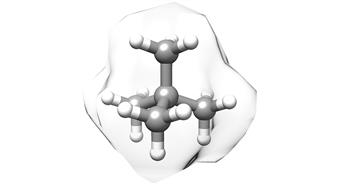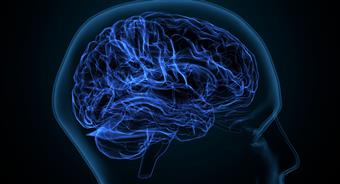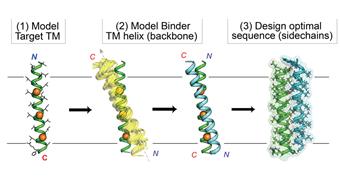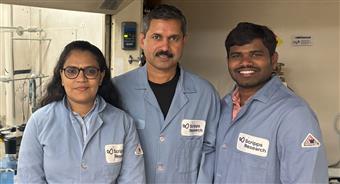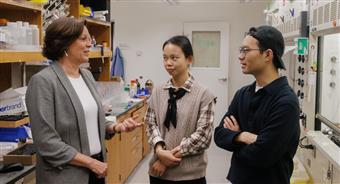
Want to know which mutations are really risky? New Scripps Research method may help Study bridges basic science and techniques to advance therapeutics.
August 28, 2018
We're all mutants, explains William Balch, PhD, a professor at Scripps Research. Scientists have long assumed that a person who appeared healthy had a relatively normal genome. But we're now realizing that variation is rampant and makes us who we are uniquely, he says.
That's why Balch and his lab have designed a way to look at a strand of DNA to find out what trait it codes for, or what deleterious mutation it might harbor. We need to understand how these variants contribute to a trait like the color of your hair or, importantly, the harmful ones, a disease, says Balch.
Until recently, there was no way to compare variants across large groups of people. Now, with the technology to sequence the human genome getting cheaper and cheaper, and with the launch of the national All of Us Research Program, Balch thinks we finally have enough data to determine how variants shape the population and each of us as individuals and how variants could inform drug design.
Balch and study first author Chao Wang, PhD, a postdoctoral associate at Scripps Research, describe their tool for studying human genomes in a paper out recently in the journal Cell Reports. Using a statistical method called Gaussian-process based machine learning, scientists can now take a gene, any gene, and using only a few of the many variants found in the population, discover the many shapes of the protein it encodes for and the many functions of those shapes.
This tells us how the entire protein is put together from a dynamic and biologically relevant perspective and what happens when there is a defect, Balch says.
As a proof of concept, the team looked at genetic variants in people with cystic fibrosis. The sparse collection of variants the researchers focused on sit on different spots on the DNA code. When this code is read by the cell to make a protein, the variants code for specific amino acids the building blocks of the protein.
Now, with their new variation spatial profiling' method that captures sequence meaning through its functions, the DNA code takes on a new physical structure a phenotype landscape, as Balch sees it, that can be mined.
On that landscape sit the data points of collected variants that tell something about the protein's many roles in the worldwide population. These data points are like boreholes delineated on a physical map that, when analyzed together, help the petroleum industry determine where to drill for oil. We've adapted that to biology, Balch says.
On the protein, these trusted variant locations told Wang and Balch where the protein was vulnerable to mutations that cause cystic fibrosis. Using a new biological principle, they termed spatial covariance,' by analogy to its use in physics, geology and machine learning, their analysis then predicted the likelihood where uncharacterized mutations found in the rest of the protein could also cause disease.
From a sparse amount of information, we can measure the consequences of variation across the entire protein, says Balch. A second test showed the method could also assess variants linked to Alzheimer's disease to predict onset. The approach is universal in design and can be applied to many challenging questions in understanding human disease, from neurodegeneration to cancer.
The new method could prove useful in assessing future therapies as Wang and Balch showed how spatial covariance can predict the response of variation in the population to a therapeutic. Many drugs fail in clinical testing because they only help a fraction of people and are developed with disease models with poor relevance to human biology. A better understanding of human genetic variation in the early stages of drug development may now reveal how different pathways in the population will respond to drug treatment, and how drugs can be tailored for personalized medicine.
We are using evolution's rules to understand you' by looking at how the rules are played out in all of us,' says Balch.
The work in this study is part of a growing effort to use machine learning to inform biology and medicine. For example, Oxford's Mihaela van der Schaar, PhD, is harnessing a different form of machine learning using clinical data directly to make recommendations for patient care. And Caltech's Francis Arnold, PhD, is pioneering use of Gaussian processing to engineer proteins for practical industrial processes.
Balch and Wang are now taking advantage of rapid advances in artificial intelligence to understand how variants interact across the entire genome to predict and manage human biology.
This is just step one as we recognize the approach will enable a deeper understanding of central dogma [DNA to RNA to protein] in a new spatial framework, its role in natural selection and perhaps our origins, Balch says.
The study, Bridging Genomics to Phenomics at Atomic Resolution through Variation Spatial Processing, was supported by the National Institutes of Health (grants HL095524, DK051870 and AG049665), the Tobacco-Related Disease Research Program (grant TRDRP 23RT-0012) and by Cystic Fibrosis Foundation Therapeutics.
Molecular Medicine Balch, William
More from Scripps
20/04/2024
New copper-catalyzed C-H activation strategy from Scripps Research Two-mode reactions inspired by human detox enzymes offer powerful new tools for drug discover...
12/04/2024
Scripps Research chemists devise easier new method for making a common type of building block for drugs Scientists transform simple linear amines into saturated...
06/04/2024
A simple, inexpensive way to make carbon atoms bind together A Scripps Research team uncovers a cost-effective method for producing quaternary carbon molecules,...
04/04/2024
Developing a vaccine for the zombie drug xylazine Scripps Research chemical biologists design an early proof-of-concept vaccine that could lead to the first...
30/03/2024
How blocking a neural receptor responsible for addiction could reduce alcohol use A Scripps Research team found that a new therapeutic that targets the kappa op...
13/03/2024
New computational strategy boosts the ability of drug designers to target proteins inside the membrane Customized-design approach could streamline the design of...
29/02/2024
Scripps Research scientists reveal how first cells could have formed on Earth New phospholipid discovery brings researchers closer to understanding how primordi...
29/02/2024
How molecular handedness emerged in early biology Scripps Research chemists fill a major gap in origin-of-life theories.
February 28, 2024
LA JOLLA, CA Mole...
22/02/2024
Snaking toward a universal antivenom Scripps Research scientists discovered antibodies that protect against a host of lethal snake venoms.
February 21, 2024
...
06/02/2024
Calibr-Skaggs announces expansion of option and license agreement with AbbVie to develop novel cell therapies for solid tumors and autoimmune diseases
AbbVie...
26/01/2024
Re-energizing mitochondria to treat Alzheimer's disease Scripps Research team restored neuron-to-neuron connections in human cells.
January 25, 2024
LA JO...
24/01/2024
100 years of Science Changing Life: Scripps Research celebrates a century of transforming human health For the last century, institute leaders and renowned scie...
23/01/2024
New technology lets researchers track brain cells' off switches The method could shed light on what goes awry in numerous brain conditions when neurons ar...
09/01/2024
Three decades of giving: Announcing the Calibr-Skaggs Institute for Innovative Medicines The ALSAM Foundation, founded by the Skaggs family, provides lasting g...
04/01/2024
Life science entrepreneur Gene Lay joins Scripps Research Board of Directors Lay, founder of the global biotech company BioLegend, brings invaluable experience ...
21/12/2023
Taming a plant-derived toxin Scripps Research team modifies the traditional poison picrotoxinin for potential neurological drugs and anti-parasite treatments. ...
19/12/2023
Scripps Research Executive Vice President Eric Topol gives TED talk on transformative power of AI in medicine Topol provides an overview of how AI models can i...
13/12/2023
New AI-powered algorithm could better assess people's risk of common heart condition Early detection of atrial fibrillation can reduce the risk of stroke an...
07/12/2023
Nanoparticle flu vaccine design shows promise in early tests Scripps Research-designed vaccine could provide broad, enduring protection against influenza A str...
16/11/2023
Numerous Scripps Research scientists named Highly Cited Researchers Clarivate's annual, global list represents researchers who have demonstrated significant...
07/11/2023
Multiple sclerosis drug invented at Scripps Research slows long-term devastating disease progression Late-breaking data reinforces the effectiveness and safety ...
05/10/2023
Keren Lasker named a 2023 Moore Inventor Fellow The prestigious award will support Lasker's inventive research in membraneless organelles and their applica...
22/09/2023
Michael Bollong named a 2023 Amgen Young Investigator The prestigious award will support Bollong's research identifying new molecular targets and therapeuti...
09/09/2023
Philip Dawson receives 2024 American Chemical Society National Award Dawson is honored with the Arthur C. Cope Late Careers Scholar Award for his foundational c...
07/09/2023
Scripps Research chemists devise a method for C-H activation of alcohols The method represents a new toolkit for making drugs and other compounds.
September 06...
31/08/2023
Scripps Research receives $1.5M to surveil infectious disease threats in wastewater Bill & Melinda Gates Foundation award to support the development of multi-pa...
16/08/2023
How cold temperatures trigger the brain to boost appetite Scripps Research scientists' discovery could lead to new weight loss and metabolic health treatmen...
08/08/2023
Human antibody that targets carfentanil, fentanyl and related opioids reverses overdose effects in preclinical study Scripps Research-developed antibody therapy...
04/08/2023
How sensory neurons impact the gut Scripps Research scientists show that the receptor PIEZO2 in sensory neurons controls gut motility and transit time, which a...
26/07/2023
AbbVie and Calibr Expand Strategic Collaboration to Advance Several Preclinical and Early-stage Clinical Assets The expanded strategic collaboration will advan...
23/07/2023
Scripps Research scientists develop AI-based tracking and early-warning system for viral pandemics Machine-learning system effectively predicts emergence of pro...
19/07/2023
Monitoring T cells may allow prevention of type 1 diabetes Scripps Research study shows that analyzing T cells in blood samples could be used to select at-risk ...
19/07/2023
Scripps Research mourns passing of leading organic chemist Albert Eschenmoser Eschenmoser pioneered key reactions in synthetic chemistry and shaped the understa...
15/06/2023
Scripps Research awarded $46.8 million by NIH to promote human health through innovative translational science and training The Translational Institute is harne...
13/06/2023
Scripps Research's Danielle Grotjahn named 2023 Pew Scholar in the Biomedical Sciences The award will support Grotjahn's study of how cells assemble the...
31/05/2023
Crossing the ring: new method enables C-H activation across saturated carbocycles Scripps Research chemists add another powerful tool to their molecular editin...
24/05/2023
Scripps Research develops behind-the-scenes tool for better biomedical data discovery The new resource makes datasets more discoverable for life science communi...
19/05/2023
Scripps Research neuroscientist Hollis Cline elected to American Academy of Arts and Sciences Cline is recognized for her discoveries about the role of sensory ...
19/05/2023
Scripps Research's Skaggs Graduate School awards doctoral degrees to 31st graduating class Commencement ceremony will be livestreamed via Zoom and on instit...
13/05/2023
A better route to benzocyclobutenes, sought-after building blocks for drugs Scripps Research chemists devise a new, C-H activation-based method for the synthesi...
09/05/2023
Renowned Scripps Research professor Jeffery Kelly elected to National Academy of Sciences Kelly's groundbreaking work on protein misfolding has led to thera...
28/04/2023
Mirror-image molecules pave new path for cancer drug discovery By comparing how mirror image versions of small molecules impact clusters of proteins, Scripps R...
22/04/2023
How alcohol consumption contributes to chronic pain A Scripps Research team showed how both alcohol intake and alcohol withdrawal can lead to increased pain and...
21/04/2023
Xin Jin receives dual awards to study autism risk genes in neurodevelopment Major grants from the National Institutes of Health and California Institute for Reg...
20/04/2023
Trim the sugar: New HIV vaccine design improves immune response Scripps Research vaccine candidate headed for clinical trials.
April 19, 2023
LA JOLLA, CA A...
18/04/2023
Therapeutic can seek and destroy potent opioid to treat overdoses Scripps Research chemists developed a new biologic to work against the synthetic opioid carfen...
07/03/2023
How heavy alcohol consumption increases brain inflammation The findings by a Scripps Research team point toward a potential new drug target for treating alcohol...
02/03/2023
Scientists find human antibodies that can block multiple coronaviruses including SARS-CoV-2 Results from a Scripps Research and UNC team pave the way for a vacc...
28/02/2023
$10 million grant funds Scripps Research Alcohol Research Center through its 50th year The five-year grant supports research into the neurobiology of alcohol us...
28/02/2023
Immune system drug shows promise in treating alcohol use disorder, a Scripps Research clinical trial reports Scientists at Scripps Research found that apremilas...
 Want to know which mutations are really risky? New Scripps Research method may help Study bridges basic science and techniques to advance therapeutics.
Want to know which mutations are really risky? New Scripps Research method may help Study bridges basic science and techniques to advance therapeutics.















